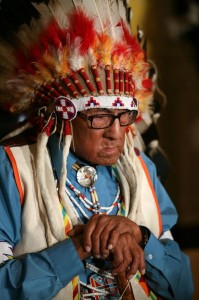Native American Heritage Month: Joseph Medicine Crow
Monday, November 15th, 2021
Joseph Medicine Crow was the last surviving war chief of the Crow people. He was a tribal historian and anthropologist, teaching the culture and history of the Crow and other Plains peoples. He is pictured here receiving the 2009 Presidential Medal of Freedom, America’s highest civilian honor.
© EPA/Alamy Images
People in the United States observe Native American Heritage Month each year in November. During this period, many Native tribes celebrate their cultures, histories, and traditions. It is also a time to raise awareness of the challenges Indigenous people have faced in the past and today, along with their contributions to the United States as its first inhabitants.
Joseph Medicine Crow was an activist, author, historian, and leader of the Crow people. He served as tribal historian and anthropologist, teaching others the culture and history of the Crow and other Plains peoples. He was the last surviving war chief of the Crow people.
Joseph Medicine Crow (also known as High Bird) was born on Oct. 27, 1913, in southern Montana, near Lodge Grass. He was raised in the tradition of Crow warriors by his grandfather, named Yellowtail. Medicine Crow learned the history of the Crow from various elders. His great-uncle, named White Man Runs Him, had served as a scout for United States Army officer George Armstrong Custer just before the Battle of the Little Bighorn. White Man Runs Him told Medicine Crow about this experience. Medicine Crow later studied at Linfield College in McMinnville, Oregon, graduating in 1938. He earned a master’s degree in anthropology from the University of Southern California in Los Angeles in 1939, becoming the first Crow person to receive a graduate degree. Medicine Crow later worked as a teacher at a Native American school in Oregon.
Medicine Crow enlisted in the United States Army in 1943 and fought against Germany during World War II (1939-1945). Among Plains peoples, acts of bravery in battle are often considered more prestigious than killing. Such acts, sometimes called counting coup, can be recorded against any enemy. During his military service, Medicine Crow accomplished the four acts of bravery necessary to achieve the status of war chief. These acts are (1) successfully leading a war party against an enemy; (2) entering an enemy camp and stealing a horse; (3) disarming an enemy in battle; and (4) touching a living enemy. A Crow council of elders named Medicine Crow war chief in 1946 after learning of his exploits against German soldiers.
The council appointed Medicine Crow official tribal historian and anthropologist in 1948. Medicine Crow wrote and lectured widely on the Battle of the Little Bighorn and other topics of Plains history. His books include From the Heart of the Crow Country: The Crow Indians’ Own Stories (2000) and Counting Coup: Becoming a Crow Chief on the Reservation and Beyond (2006). In 2009, he received the Presidential Medal of Freedom for his contributions to the preservation of the culture and history of Native Americans. He died on April 3, 2016.


